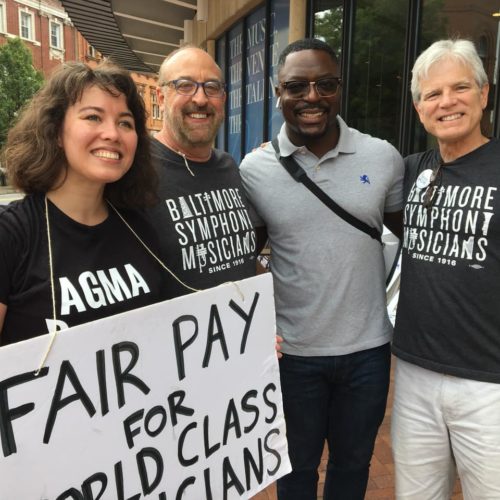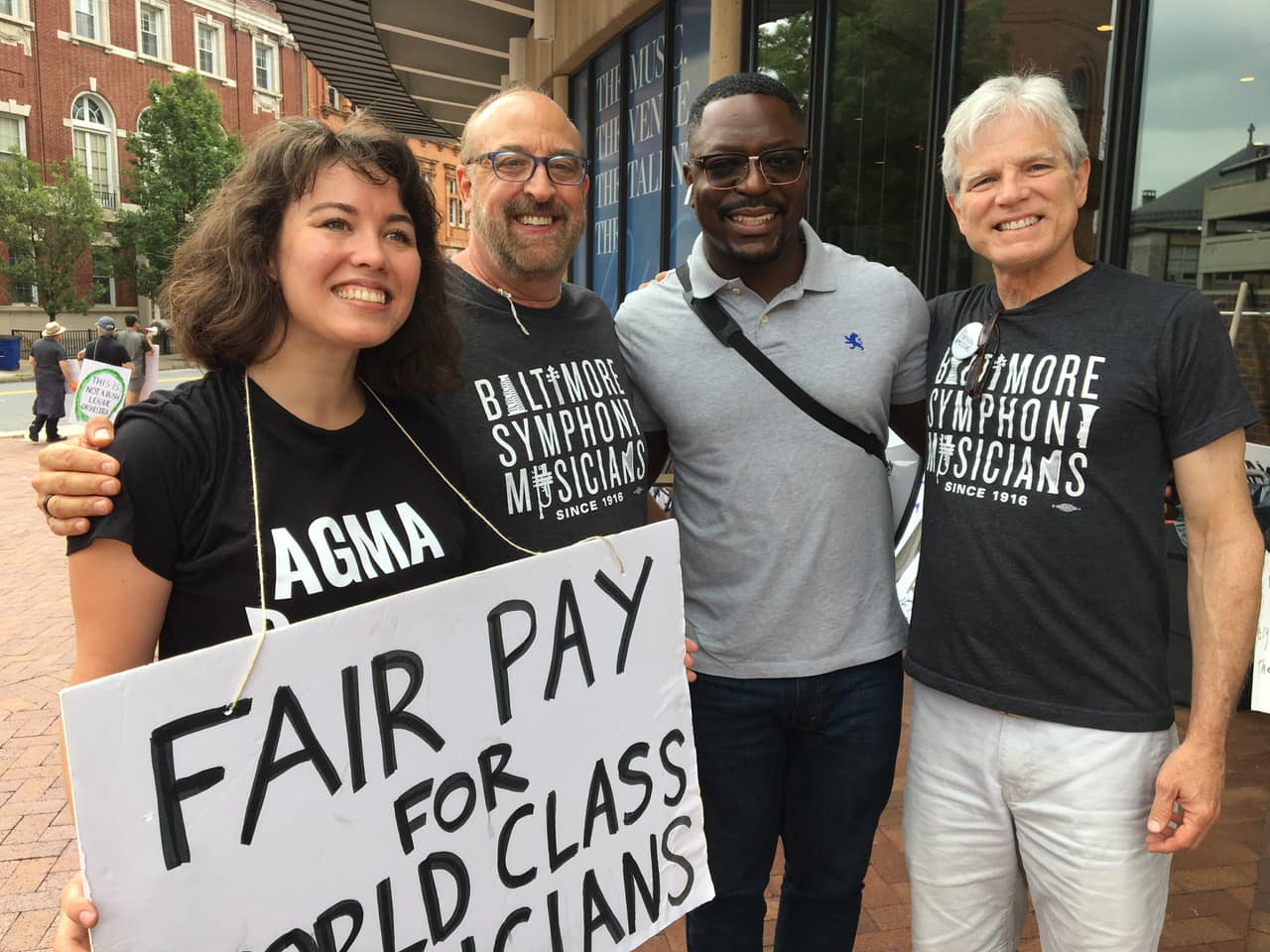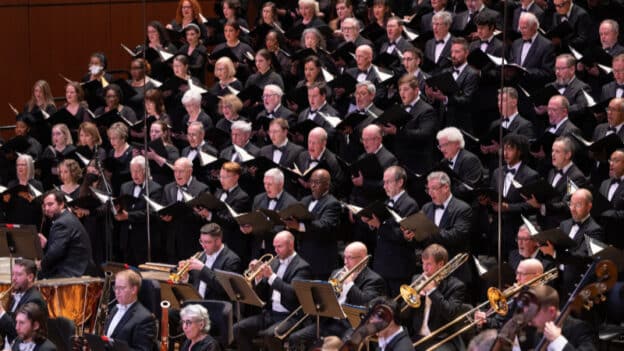Baltimore declares its musicians to be on strike
mainAfter locking the players out for three months, the Baltimore Symphony Orchestra says they are now on strike after having refused to accept a reduced contract.
Here’s the aggressive new language:
MEDIA ADVISORY: Baltimore Symphony Musicians on Strike:
Season Opening Concerts Postponed
Baltimore (September 13, 2019) The musicians of the Baltimore Symphony Orchestra (BSO) have not returned to work this week. Therefore, please note the following changes to our season opening plans…







(A) This is despicable.
(B) They are mistaken (or, less charitably, lying). A strike is when the workers initiate the work stoppage, saying “we won’t come back to work unless you grant us x-y-z;” a lockout is when management initiates the work stoppage, saying “we won’t allow you to come back to work until you concede x-y-z.”
https://www.google.com/search?client=firefox-b-1-d&q=definition+of+lockout+vs+srike
Management offered musicians the option of returning under the terms of their previous contract (while negotiations on the next contract continue) through Dec. 31. The musicians refused to return. I think that changes the situation from lockout to strike.
That’s the same thing they offered them last year. Look how that ended. I would encourage you to read more material on this matter. I don’t believe you have a full understanding of the situation yet. I just read the musicians filed an unfair labor practice suit with the NLRB, which goes to their point of management failing to negotiate in good faith as per law; they chose to impose a lockout, achieving a 40-wk season without discussion. Would you want to go back into that workplace for a chance to do it all over again?
MWnyc – I disagree. Saying “you’re welcome to come back as long as you concede x-y-z” is the same as saying “you can’t return unless you concede x-y-z.”
(Notice I said “I disagree,” not “you’re wrong.” I’m not sure what the situation would be legally speaking at this moment, but to me this says they’re being kept out until they agree to an offer they’ve already deemed unacceptable. Taken to a point of — I hope — absurdity, management could say “well, we offered them a compensation package competitive with McDonald’s. We wait to welcome them back with open arms, and yet they refuse to come back to work. So… they’re on strike.”)
They postponed the opening for a week. Is that standard or is a deal in progress?
What does “world-class” mean if every orchestra claims their musicians are that?
Every time an orchestra goes on strike or is locked out, they claim they are “world class”.
The term no longer has any meaning.
Many BSO musicians played with us as subs during the Chicago Symphony’s summer Ravinia season. They sounded pretty world class to us, and we look forward to welcoming them back this fall, for as long as they are locked out.
I think world class means that an orchestra and most of its players would stand up well in comparison with other groups or players from around the world. Many times it is overused, I totally agree, but in the case of the Baltimore Symphony I fully agree that many of these players could easily be playing in other top orchestras around the world. I have over my nearly 40 years as a full time orchestral musician in a few not quite world class ensembles heard most of the best groups in the USA and many foreign as well. The BSO particularly when playing in their flattering resonant hall is world class. I am not saying the best in the world, but certainly YES world class. I think we will see the evidence as players make an exit from this group to others. The whole situation is sad. Players spend a lifetime honing skills and are held to a mind boggling, exacting performance standard. If only the board members and executives responsible for the business side were held to even close to the same standards. The money is there to support at least one full time orchestra in a state as wealthy and small as Maryland. Not having the talent to get it is the issue, and that is not the players job.
The best players in pretty much any regional orchestra could play in the major orchestras if they had the opportunity. The level of playing now is that high. So this isn’t a surprise.
I don’t believe that is an accurate statement, Ernesto. And it seems to trivialize what the players in the truly great orchestras have achieved. There are distinctions.
I disagree about the trivialization. It’s just an acknowledgement that there are more stellar players out there than there are jobs for stellar players.
Even if not quite true of “regional orchestras”, the standard of playing is so much higher than in the past that nowadays second tier orchestras play as well as the leading orchestras of the past. There really isn’t much difference in the standard of playing among the musicians in a top-20 orchestra and a top-5 orchestra in the US.
I’d cross the picket line.
If I were on it, I’d stone you.
Violence and monopoly.
The two keystones of orchestra unions: exclude the competition from entering the job market, and if that fails, break their playing arms.
Just another anti-union troll, aren’t you….
Collective bargaining is the only way individual workers have a chance to resist the will of the rich and powerful. Scabs crossing picket lines, such as you appear to boast being one of, deserve harsh treatment.
What’s worse: Taking a job that’s available or physically beating up people who do? Hmmm
The first.
Mr. Knowitall – you’ve conveniently sidestepped Sam’s argument and instead elected to knock down a much lighter straw-man. Sam said nothing against collective bargaining. Workers have the right of free assembly and may privately meet and attempt to collectively bargain if they so choose. They don’t have the right to prevent others who are willing to work for the offered wages from doing so. Violence is wrong from whichever side of the picket line.
Crossing the picket line is an anti-union act. Without the ability to withhold labor from employers, collective bargaining has no power. This is why members of one union respect the picket line of another. And it is why, as I wrote above, scabs receive harsh treatment.
Mr. Knowitall has advocated physical violence on this blog. I suggest this account be banned, Norman.
Let’s virtually stone Stuart while we’re at it.
I wouldn’t cross the picket line but I would strongly advise the musicians to take the deal they are being offered. I do not think they are going to win.
This is a work stoppage, in protest of BSO’s illegal imposition, without first achieving impasse, as stated in the Unfair Labor Practice charge we filed last Tuesday.
Brian, what I would have loved for you and the musicians’ supporters groups to have done by now is illustrated by the most recent previous thread on this subject at Slipped Disc. It quoted a subscriber of 44 years’ standing who wrote to the Baltimore Sun blasting the board and management and accusing them of wanting to destroy the orchestra. That’s fine if that’s his opinion. Here’s the problem: EVERY letter that I’ve seen to the Baltimore Sun and the Washington Post about the lockout/stoppage/whatever is from a “decades-long” subscriber/donor/supporter of the orchestra who adopts something of a resentful or angry tone, often ending in a swipe in general at the supposed place of classical music or culture generally in America.
No matter how deep and bitter the conflict, somehow it doesn’t seem to be in the DNA of either side to the dispute that it would be dramatically more helpful to see letters from NEWER fans of the Baltimore Symphony Orchestra, and I would add those who preferably are NOT donors to the orchestra but just love the music and the performances that you guys so admirably put forth both at the Meyerhoff and at Strathmore. This should have been specifically solicited by “Save Our BSO” and whatever other allies you have. Maybe you still can.
If you don’t understand this point, I’ll add this from where I sit in the Washington area. It’s been reported in various places, including the New York Times, that one of the true underlying problems of the BSO is that however decent (let’s call it) the attendance may be at Strathmore, the level of philanthropic support from the Washington suburbs has been less than expected. I’ve seen columns in the Baltimore Sun from what I presume are parties sympathetic to your cause generically trying to shame the multimillionaires of Maryland, obviously including Montgomery County, to support the Baltimore Symphony Orchestra.
But this is basically yelling into the wind, because what everyone needs to understand is that while there is a great deal of wealth in the Washington suburbs, it has rotated to new and different industries. The entrepreneurs in these fields are coming from different segments of society who may or may not even have the Baltimore Symphony Orchestra on their radar screen. If they and their personal friends have never been, the chances of them seeing the virtue in contributing is basically zero. A simple way of putting this is that both sides must understand the primacy of putting fannies in the seats over everything (and no, an outreach program to local students, however admirable and constructive, is not the same thing). When you lose track of this, bad things will ultimately happen.
There is no question that the timeline, the communications (to politicians, the musicians, and the public), and the general arc of this situation since last fall by BSO management, as you and others have described in various forums, has been very strange. For that, most everyone has sympathy. But I hope you understand the points above. When disputes go nuclear, they can easily get lost. Thank you.